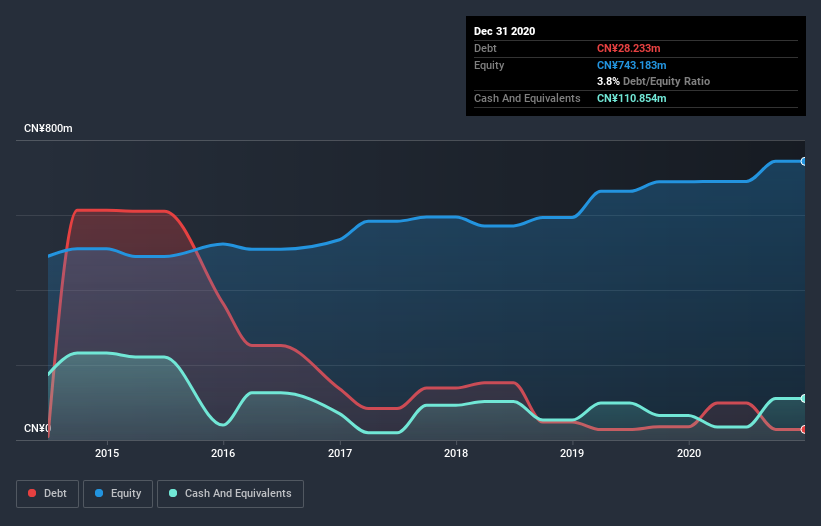- Hong Kong
- /
- Real Estate
- /
- SEHK:2330
China Uptown Group (HKG:2330) Takes On Some Risk With Its Use Of Debt
Warren Buffett famously said, 'Volatility is far from synonymous with risk.' So it might be obvious that you need to consider debt, when you think about how risky any given stock is, because too much debt can sink a company. As with many other companies China Uptown Group Company Limited (HKG:2330) makes use of debt. But the real question is whether this debt is making the company risky.
When Is Debt A Problem?
Debt is a tool to help businesses grow, but if a business is incapable of paying off its lenders, then it exists at their mercy. If things get really bad, the lenders can take control of the business. However, a more common (but still painful) scenario is that it has to raise new equity capital at a low price, thus permanently diluting shareholders. Of course, debt can be an important tool in businesses, particularly capital heavy businesses. The first step when considering a company's debt levels is to consider its cash and debt together.
Check out our latest analysis for China Uptown Group
What Is China Uptown Group's Debt?
You can click the graphic below for the historical numbers, but it shows that China Uptown Group had CN¥28.2m of debt in December 2020, down from CN¥35.3m, one year before. However, its balance sheet shows it holds CN¥110.9m in cash, so it actually has CN¥82.6m net cash.

How Healthy Is China Uptown Group's Balance Sheet?
The latest balance sheet data shows that China Uptown Group had liabilities of CN¥319.0m due within a year, and liabilities of CN¥34.2m falling due after that. On the other hand, it had cash of CN¥110.9m and CN¥26.6m worth of receivables due within a year. So it has liabilities totalling CN¥215.8m more than its cash and near-term receivables, combined.
Given this deficit is actually higher than the company's market capitalization of CN¥173.7m, we think shareholders really should watch China Uptown Group's debt levels, like a parent watching their child ride a bike for the first time. Hypothetically, extremely heavy dilution would be required if the company were forced to pay down its liabilities by raising capital at the current share price. Given that China Uptown Group has more cash than debt, we're pretty confident it can handle its debt, despite the fact that it has a lot of liabilities in total.
The modesty of its debt load may become crucial for China Uptown Group if management cannot prevent a repeat of the 89% cut to EBIT over the last year. When a company sees its earnings tank, it can sometimes find its relationships with its lenders turn sour. There's no doubt that we learn most about debt from the balance sheet. But it is China Uptown Group's earnings that will influence how the balance sheet holds up in the future. So if you're keen to discover more about its earnings, it might be worth checking out this graph of its long term earnings trend.
Finally, a company can only pay off debt with cold hard cash, not accounting profits. While China Uptown Group has net cash on its balance sheet, it's still worth taking a look at its ability to convert earnings before interest and tax (EBIT) to free cash flow, to help us understand how quickly it is building (or eroding) that cash balance. Considering the last two years, China Uptown Group actually recorded a cash outflow, overall. Debt is far more risky for companies with unreliable free cash flow, so shareholders should be hoping that the past expenditure will produce free cash flow in the future.
Summing up
Although China Uptown Group's balance sheet isn't particularly strong, due to the total liabilities, it is clearly positive to see that it has net cash of CN¥82.6m. Despite the cash, we do find China Uptown Group's EBIT growth rate concerning, so we're not particularly comfortable with the stock. When analysing debt levels, the balance sheet is the obvious place to start. But ultimately, every company can contain risks that exist outside of the balance sheet. To that end, you should be aware of the 3 warning signs we've spotted with China Uptown Group .
Of course, if you're the type of investor who prefers buying stocks without the burden of debt, then don't hesitate to discover our exclusive list of net cash growth stocks, today.
If you decide to trade China Uptown Group, use the lowest-cost* platform that is rated #1 Overall by Barron’s, Interactive Brokers. Trade stocks, options, futures, forex, bonds and funds on 135 markets, all from a single integrated account. Promoted
New: AI Stock Screener & Alerts
Our new AI Stock Screener scans the market every day to uncover opportunities.
• Dividend Powerhouses (3%+ Yield)
• Undervalued Small Caps with Insider Buying
• High growth Tech and AI Companies
Or build your own from over 50 metrics.
This article by Simply Wall St is general in nature. It does not constitute a recommendation to buy or sell any stock, and does not take account of your objectives, or your financial situation. We aim to bring you long-term focused analysis driven by fundamental data. Note that our analysis may not factor in the latest price-sensitive company announcements or qualitative material. Simply Wall St has no position in any stocks mentioned.
*Interactive Brokers Rated Lowest Cost Broker by StockBrokers.com Annual Online Review 2020
Have feedback on this article? Concerned about the content? Get in touch with us directly. Alternatively, email editorial-team (at) simplywallst.com.
About SEHK:2330
China Uptown Group
An investment holding company, engages in the property investment and development business in Mainland China and Hong Kong.
Adequate balance sheet with low risk.
Market Insights
Community Narratives



